

Subscribe to EcoJustice Radio:
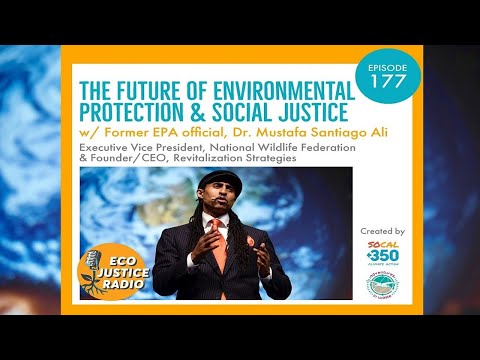
Watch this video on YouTube
Dr. Mustafa Santiago Ali: The Intersection of Environment and Equity
Breathing clean air and drinking clean water are fundamental rights. However, these have been denied to many low-income communities and communities of color, who often live next to massive industrial facilities that pollute the air and water.
Our guest from an encore presentation from early in 2023 is Dr. Mustafa Santiago Ali, former EPA official and now Executive Vice President at the National Wildlife Federation and Founder and CEO of Revitalization Strategies. He has been working toward solving historical injustices that target certain communities for class- and race-based discrimination putting them in the path of harm from toxic exposure, climate disruption, and industrial accidents.
The conversation with Dr. Ali took us through the corridors of the EPA, where he began his career working on social justice issues. He shared insights into his role as a founding member of the EPA’s Office of Environmental Justice, and how he witnessed firsthand the struggles of low-income communities and communities of color who bear the brunt of industrial pollution.
Dr. Ali provided an acute analysis of recent environmental catastrophes, like the toxic train derailment in East Palestine, Ohio, and the profound implications of the Supreme Court’s decision limiting the EPA’s regulatory powers with regards to climate-destroying greenhouse gases. His holistic approach to addressing these challenges emphasizes the need for a concerted effort that goes beyond environmental protection to include economic justice and community revitalization.
One of the most poignant moments in the episode was Dr. Ali’s recount of his decision to resign from the EPA during the Trump administration. His resignation letter was not just a document; it was a testament to his integrity and his belief that environmental protection should not be compromised, no matter the political climate.
Dr. Ali’s message is clear: environmental protection and social justice are inextricably linked, and it’s up to each of us to use our talents and resources to contribute to the change we wish to see. Whether it’s advocating for stricter regulations on drinking water pollutants such as forever chemicals or PFAS, or regulating vehicle pollution standards. He also discussed the importance of supporting local frontline organizations, or simply staying informed, there’s a role for everyone in this journey toward a just and sustainable future.
Through his public advocacy, Dr. Ali shares his holistic approach to empowering and revitalizing vulnerable communities to secure environmental, health, and economic justice. And how all of us can use our talents to be part of the larger change while also curbing climate anxiety and burnout.
STORY: The Intelligence of Nature for Planetary Healing w/ Dr. Zach Bush
For an the extended interview, CLICK HERE
From EPA Administrator to Environmental Advocate: Interview Excerpt
Jessica Aldridge: Oh, my gosh, it’s an honor to be with you. I have so many questions for you, Dr. Mustafa Santiago Ali, you are a former high ranking EPA official who helped found the Office of Environmental justice and have over two decades of service to the EPA. In 2017, during the Trump administration, and when Pruitt was assigned as the EPA administrator, you resigned from the EPA with a pretty amazing resignation letter. And we’re going to get into the details of your resignation. But first, I want to break down the EPA for a second, just in case. May not all understand what the role is. Right. Given their name, we can assume that everyone understands that the purpose of the EPA. Is the Environmental Protection Agency supposed to protect us? Right. They may expect a lot from the EPA and assume that their purpose is to protect the environment. Simply put, what is the role of the EPA? Does the EPA create regulations? Do those need to be approved by Congress? Break it down.
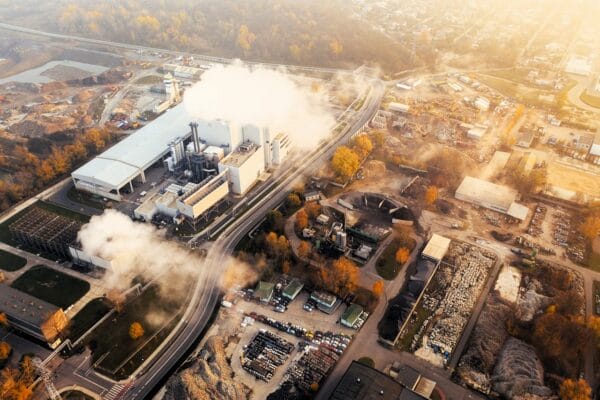
Mustafa Ali: It’s all of, you know, let’s start at the basics that sometimes people miss about the Environmental Protection Agency. Its mission is to protect public health and the environment. And we often miss that public health aspect in people’s general understanding of the agency. And the agency works under a number of sets of laws, some that people are familiar with, the Clean Air Act, the Clean Water Act, Ricra, Superfund. Some people have heard about Superfund, some of our most toxic sites across our country. So Congress creates those sets of laws, and then EPA lives them out through regulations and statutes. And, you know, the main job of EPA, is to make sure that you and your children have a healthy environment to live in, and that we are regulating those toxins that can make you sick, that can shorten your life, and also give business and industry, a sort of a set of parameters on which they can operate in. So that’s the 60 seconds and the.
Jessica Aldridge: Office that you were the founder of, the Office of Environmental Equity at the EPA, which eventually became the office of Environmental justice. What was the purpose of this office and your role within it?
Mustafa Ali: Well, the office actually came about through a set of recommendations from the Michigan working group in the late eighty s and early ninety s, a number of frontline leaders, academics, and others who are saying that we have these laws that are in place, but all of the people are not being protected, especially vulnerable communities, lower wealth, white communities, communities of color, and indigenous brothers and sisters. We’re dealing with these sets of impacts that were happening from toxic pollution, from lack of being able to fully participate, in the decision making process. So that office was created, in November of 1992, underneath of, William Riley at that time, who was a republican administrator of the Environmental Protection Agency. But it came back to communities, asking for there to be this central place in the federal government where they could come have conversations, have a better way of getting in the door, if you will, being able to understand some of the choices that were being made, and hopefully be able to play a role in framing out of many of the actions that EPA would be doing.
You left the EPA during the Trump administration
Jessica Aldridge: And as I mentioned a moment ago, you left the EPA during the Trump administration, and I mentioned your resignation letter. Why did you leave?

Mustafa Ali: because I took an oath. I took an oath to protect our country. And I felt that, and it wasn’t just a know. At that time, incoming President Trump and, the folks that he had identified to be administrator were very clear about how they felt about environmental protection and that it needed to be, minimized. And I understood that our most vulnerable communities already were not getting everything that they needed to keep them safe, to help them to move, from surviving to thriving, as I often talk about, and that they were going to place people’s lives in greater jeopardy. And I knew that all the promises and everyone who had invested in me all those years, from grassroots leaders to civil rights leaders, to a number of other folks, that I just couldn’t personally be a part of it. I believe that if you’re going to serve under an administration, then that means that you have to be in alignment, with some of the things that they’re trying to move forward on. And I couldn’t be a part of hurting communities across our country.
Jessica Aldridge: Yeah, that’s pretty bold, and I highly respect that. Thank you.
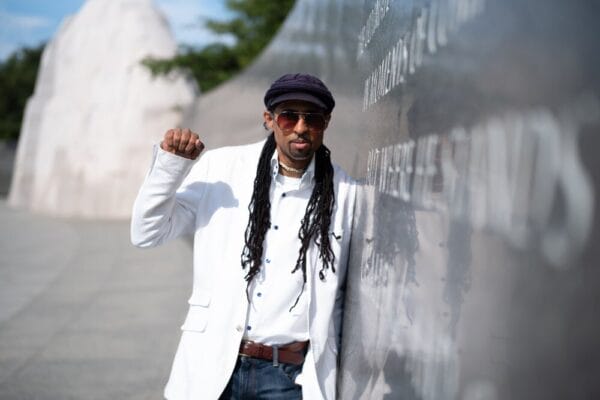
Before joining NWF, Dr. Ali was the Senior Vice President for the Hip Hop Caucus (HHC), a national nonprofit and nonpartisan organization that connects the Hip Hop community to the civic process. Prior to joining the HHC, Mustafa worked 22 years at the EPA and 2 years on Capitol Hill working for Congressman John Conyers, chairman of the Judiciary Committee. He began advocating on social justice issues at the age of 16 and joined the EPA as a student, becoming a founding member of the EPAs Office of Environmental Justice.
Jessica Aldridge, Co-Host and Producer of EcoJustice Radio, is an environmental educator, community organizer, and 15-year waste industry leader. She is a co-founder of SoCal 350, organizer for ReusableLA, and founded Adventures in Waste. She is a former professor of Recycling and Resource Management at Santa Monica College, and an award recipient of the international 2021 Women in Sustainability Leadership and the 2016 inaugural Waste360, 40 Under 40.
More Info/Resources:
https://www.gq.com/story/mustafa-ali-epa-interview
Podcast Website: http://ecojusticeradio.org/
Podcast Blog: https://www.wilderutopia.com/category/ecojustice-radio/
Support the Podcast: Patreon https://www.patreon.com/ecojusticeradio
PayPal https://www.paypal.com/donate/?hosted_button_id=LBGXTRM292TFC&source=url
Guest: Dr. Mustafa Santiago Ali
Executive Producer: Jack Eidt
Host and Producer: Jessica Aldridge
Engineer and Original Music: Blake Quake Beats
Episode 177
Originally Published 22 May 2023, Updated 7 January 2024

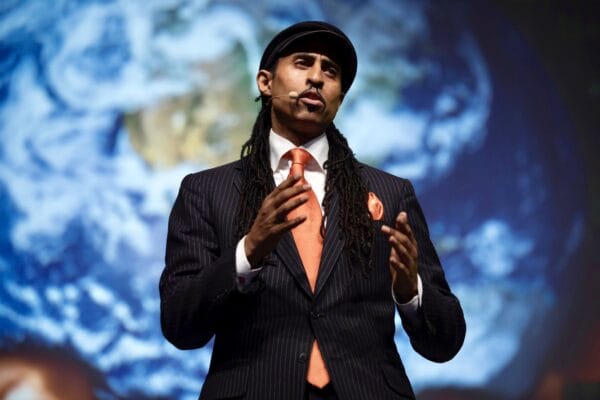



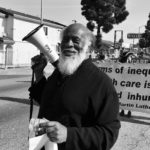




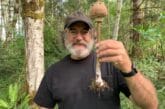



Pingback: The Intelligence of Nature for Planetary Healing w/ Dr. Zach Bush- WilderUtopia